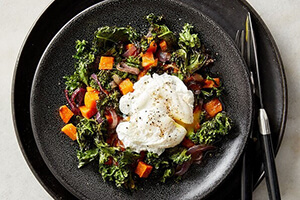Superfoods for Diabetes Month
By: Jacqueline Gomes, RDN, MBA
Diabetes is a condition many people struggle to control daily, however, taking small steps towards a healthier lifestyle is one way to reduce the stress of managing your blood sugar.
As a person with diabetes, you don’t necessarily need “special foods”. The American Diabetes association reminds us that, as with all foods, you need to work them into your individualized meal plan in appropriate portions. There is no need to purchase “specialty foods”; everything you need can be found right in our stores!
Superfoods to include on your next trip to the store:
#1: Non-starchy Veggies: Eat at least 3-5 servings of vegetables daily – Spinach, collards, kale and tomatoes.
#2: Starchy Veggies: Keep portions small, these count towards your total carb intake – Try sweet potatoes!
#3: Fresh Fruit: Rich in vitamins and minerals. Fruits contain carbs so count them towards your meal plan. – Try citrus fruits and a variety of berries which are lower in natural sugars.
#4: Poultry & Meat: Choose white, skinless meat or lean cuts of meat that are lower in saturated fat.
#5: Fish & Seafood: Include fish twice a week – bake, poach, grill or broil.
#6: Eggs: A great protein choice, add variety to your meals by scrambling or boiling an egg!
#7: Regular & Greek Yogurt: Some nonfat or lowfat Greek yogurts have twice the protein of regular yogurts (12g & 5g protein respectively per 5.3oz serving). Look for light varieties with delicious flavors and 0% fat per serving.
#8: Dried Beans, Legumes, Peas, Lentils, Nuts & seeds: Beans are an inexpensive source of protein and rich in fiber! Try to include weekly. Keep in mind that dried beans also count as a starch, so make them count towards your carbohydrate intake. Nuts and seeds are a rich source of healthy fats that also contain protein and fiber.
#9: Whole Grains: Check that whole grains like brown rice, buckwheat, oatmeal, quinoa, rolled oats, and whole-grain barley, corn, rye or wheat are first on the ingredient list. Try pearled barley and oats/oatmeal.
#10: Beverages: Choose zero-calorie or very low-calorie drinks. Try lemon and cucumber water for a refreshing way to stay hydrated!
Sources: The American Diabetes Association. Diabetes.org, The Dannon Company, Inc.
Kale & Roasted Sweet Potato Hash
Total prep: 35 minutes
Makes: 4 Servings
Ingredients:
- 1 pound sweet potatoes (about 2 small or 1 large), peeled and cut into 1/2-inch pieces (3 1/2 cups)
- 1 medium red onion, halved and sliced
- 2 tablespoons canola oil, divided
- 1 teaspoon garlic powder
- pinch salt, divided
- 4 cups chopped kale
- 4 large eggs
- 1 pinch Freshly ground pepper to taste
Directions:
- Place a large, rimmed baking sheet in the oven; preheat oven to 425 degrees F.
- Toss sweet potatoes and onion with 1 Tbsp. oil, 1/2 tsp. garlic powder, and 1/4 tsp. salt in a medium bowl. Spread in an even layer on the heated baking sheet. Roast for 20 minutes.
- Toss kale with the remaining 1 Tbsp. oil, 1/2 tsp. garlic powder, and 1/4 tsp. salt. Remove the pan from the oven, stir the vegetables, and place the kale on top. Continue roasting until the sweet potatoes have softened and are beginning to brown and the kale is wilted and slightly crisp, about 10 minutes more. Stir to combine.
- Meanwhile, bring 2 inches of water in a wide pot to a boil. Reduce heat to medium-low to maintain a gentle simmer. Crack each egg into a small bowl and slip them, one at a time, into the simmering water, taking care not to break the yolks. Poach for 4 minutes for soft-set, 5 minutes for medium-set, and 8 minutes for hard-set. Using a slotted spoon, transfer the eggs to a clean kitchen towel to drain.
- Divide the vegetable hash among 4 plates and top each serving with an egg. Season with pepper, if desired.
Nutrition Facts
Serving Size: 1 Cup Hash + 1 Egg
217 calories; protein 8.8g; carbohydrates 19.2g; exchange other carbs 1.5; dietary fiber 3.4g; sugars 6.2g; fat 12g; saturated fat 2.1g; cholesterol 186mg
Source: Diabetic Living Magazine, Winter 2020

